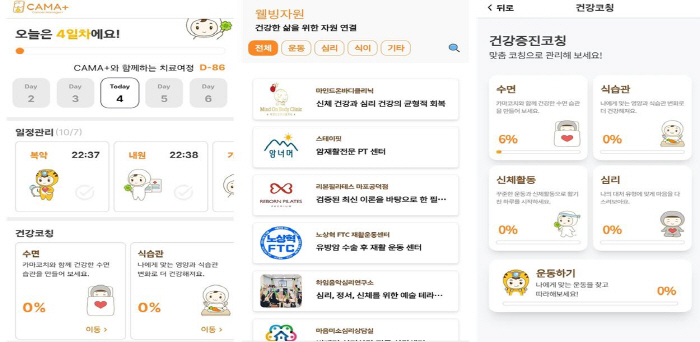Check the effect of reducing depression and anxiety in breast cancer patients using the CAMA app
Apr 08, 2025
|
Among these, research results evaluating the effectiveness of a digital customized smart app 'CAMA (CAncer MAnager)' developed to help treat and manage breast cancer patients have recently been introduced and attracting attention.
Professor Kim Sun-mi of the Department of Mental Health Medicine at Chung-Ang University Hospital and a research team at the Digital Cancer Center (Professor Han Deok-hyun of Psychiatry, Kim Hee-joon of Hematologic Oncology Department, and Kim Min-kyun of Breast Surgery) published a research paper titled 「Evaluation of the Effectiveness of a Mobile App for Breast Cancer Self-Management on Self-Efficiency」.
The research team investigated whether the use of 'CAMA (CAncer MAnager)', a mobile app developed by the Digital Cancer Center of Chung-Ang University Hospital, positively affects patients' self-efficacy and other psychological aspects to help breast cancer patients self-management according to the cancer treatment process.
Professor Kim Sun-mi's research team collected and analyzed scale data such as self-efficacy, cancer adaptability, quality of life, depression, anxiety, emotional condition, and satisfaction for a total of 66 breast cancer patients (34) who used the CAMA app from January 2023 to June 2024 and 32 breast cancer patients who maintained the existing treatment without using the app.
As a result, the breast cancer patient group using the CAMA app showed better effects on the cancer survivor self-efficacy (CSSES-K), quality of life (WHOQOL-BREF), and psychological adaptability to cancer (K-Mini-MAC) scales compared to the non-used group, and depression (PHQ-9), anxiety disorder (GAD-7), and menopausal emotional symptoms (MESQ) were found to be relatively reduced.
In particular, there was a significant difference in the CAMA app use group, in which the self-efficacy (CSSES-K) score for the pursuit of help and support improved from 38.2 to 39.9 points, while in the non-use group, the score decreased from 37.2 to 34.5 points.
In addition, in the CAMA app use group, the quality of life (WHOQOL-BREF) scale score related to psychological well-being improved slightly from 13.1 to 13.8 points, while in the non-use group, the score decreased from 14.0 to 12.7 points.
Among the sub-items of the K-Mini-MAC scale, anxiety engagement scores improved in the CAMA app use group (decreased from 22.2 to 19.2) compared to the non-use group (decreased slightly from 20.4 to 19.9), and the positive attitude score improved in the CAMA app use group (decreased slightly from 27.3 to 27.8) compared to the non-use group (decreased from 27.2 to 25.3), a statistically significant difference.
In addition, the results of the CAMA app user satisfaction survey showed that the use of the app in cancer patients had a positive effect on the treatment of cancer.
As a result, the research team confirmed that CAMA, a mobile app for self-management of cancer patients, improves self-efficacy, positive attitudes toward cancer, and improves depression and anxiety in the treatment of breast cancer patients.
Professor Kim Sun-mi of the Digital Cancer Center at Chung-Ang University Hospital "This study demonstrates the emotional positive effect of the CAMA+ app as a digital treatment in the treatment of cancer patients, and is expected to present further improved treatment results in multidisciplinary treatment of cancer patients."We will continue to develop it so that it can be extended to various cancer treatments by adding future communication functions of apps and continuously expanding content."
Meanwhile, the development of the CAMA+ app at Chung-Ang University Hospital's Digital Cancer Center was funded by the Ministry of Health and Welfare and supported by the National Cancer Center's healthcare research project, and the research team's research was published in the latest issue of the SCIE-level international journal 『Medical International Research Mobile Health and uHealth』, which is the top 20% of the global healthcare science (HALTH CARES SCIENCES & SERVICES ).
|
This article was translated by Naver AI translator.















